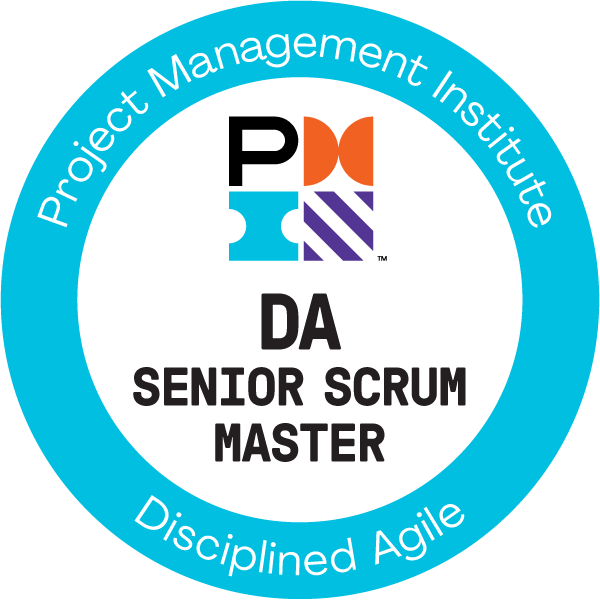PMI Disciplined Agile Senior Scrum Master (DASSM): Comprehensive Guide

Introduction to the Certification
Overview
The Disciplined Agile Senior Scrum Master (DASSM) certification, offered by PMI (Project Management Institute), is an advanced-level credential within the Disciplined Agile (DA) toolkit. It is designed to help Agile leaders and Scrum Masters broaden their capabilities by learning how to lead complex Agile transformations, manage multiple teams, and tackle cross-team dependencies. This certification goes beyond the traditional Scrum Master role by incorporating hybrid methodologies and advanced Agile leadership skills for scaling Agile across the enterprise.

Key Facts
- Launch Date: The DASSM certification was introduced in 2020, following PMI’s acquisition of Disciplined Agile (DA) to expand its Agile offerings.
- Certified Professionals: As of 2023, more than 15,000 professionals worldwide hold a DASSM certification, reflecting its growing adoption in industries needing Agile scalability.
- Key Contributors: Disciplined Agile was co-founded by Scott Ambler and Mark Lines, recognized leaders in Agile thought leadership.
Target Audience
The DASSM certification is ideal for:
- Experienced Scrum Masters, Project Managers, and Agile Coaches who are already familiar with Agile and Scrum and want to advance their expertise.
- Team Leads and Managers responsible for guiding multiple Agile teams or facilitating Agile transformations across organizations.
- Professionals aiming to manage complex projects using Agile, particularly those involving cross-functional teams or larger, scaled environments.
Certification Objectives and Learning Outcomes
Core Learning Objectives
The DASSM certification focuses on equipping professionals with:
- An advanced understanding of Disciplined Agile principles for managing large, distributed, or complex teams.
- Knowledge of how to use Disciplined Agile (DA) to address enterprise-level challenges like governance, team coordination, and hybrid approaches.
- Skills to manage dependencies across teams, identify bottlenecks, and lead Agile transformations that require a flexible approach across multiple methodologies.
Skills and Knowledge Gained
Certified DASSM professionals will acquire the following competencies:
- The ability to lead multiple teams, handle cross-team dependencies, and manage integration challenges in complex Agile environments.
- Expertise in adapting Agile frameworks (Scrum, Kanban, Lean) to different contexts, industries, or project challenges.
- Skills to mentor and coach teams towards continuous improvement, while maintaining alignment with organizational goals.

Benefits to Professionals
- Leadership Growth: DASSM helps professionals move into leadership roles like Agile Coach, Transformation Lead, or Program Manager.
- Versatility in Methods: By mastering various Agile methods, DASSM-certified professionals are prepared to handle the diverse and evolving needs of Agile teams.
- Career Advancement: As organizations scale Agile, certified leaders with the DASSM credential are in high demand for positions that require cross-team leadership.
Detailed Breakdown of the Certification Process

- Pre-requisites:
- To pursue DASSM, candidates must have at least two years of Agile experience.
- Completing the Disciplined Agile Scrum Master (DASM) certification or an equivalent certification such as Certified ScrumMaster (CSM) or Professional Scrum Master (PSM) is recommended.
- Training Requirements:
- Candidates are required to complete a two-day DASSM training course, offered by PMI or certified Disciplined Agile instructors. The course covers advanced Agile strategies, decision-making frameworks, and leadership skills.
- Exam Format:
- Number of Questions: 50 multiple-choice questions.
- Time Limit: 90 minutes.
- Passing Score: Candidates need to score at least 70% to pass the exam.
- Retake Policy: Candidates who do not pass the exam can reattempt it after completing an additional training module or by purchasing a retake.
Certification Levels:
- The DASSM is an advanced certification, sitting above the Disciplined Agile Scrum Master (DASM) certification.
- After completing the DASSM, professionals may advance to the Disciplined Agile Coach (DAC) certification, which is focused on enterprise-level coaching and leadership.
Recertification:
- The DASSM certification is valid for one year and requires professionals to maintain PMI Professional Development Units (PDUs) to renew the credential.
Key Benefits of the Certification for Organizations
Impact on Teams and Organizations
Organizations with DASSM-certified professionals benefit from:
- Scalable Agile Practices: Disciplined Agile provides flexibility, enabling organizations to scale Agile across multiple teams without the rigidity of a single framework.
- Improved Team Collaboration: The DASSM certification teaches leaders how to manage cross-team dependencies, ensuring that Agile teams remain aligned and productive.
- Enhanced Delivery Efficiency: By using Disciplined Agile’s decision-making toolkit, organizations can reduce inefficiencies, improve workflows, and deliver products faster.
Real-World Application
Organizations like IBM and Cognizant have adopted Disciplined Agile for enterprise-level transformations. With DASSM-certified leaders, these companies were able to scale Agile practices across global teams, leading to faster project delivery and improved collaboration across departments.

Industry Recognition
The DASSM certification is recognized globally, with major organizations such as Cisco, Siemens, and TD Bank incorporating Disciplined Agile into their Agile transformation strategies to ensure scalability.
Case Studies
At ING, the implementation of Disciplined Agile helped reduce project delivery times by 30% and enabled multiple teams to collaborate seamlessly on a single product backlog, significantly improving customer satisfaction.
Certification Costs and Value Proposition

Cost of Certification
- The cost of the DASSM certification exam is around $299 USD, including access to the training materials and the first attempt at the exam.
- Two-day DASSM training workshops typically range from $1,000 to $1,500 USD, depending on the training provider and location.
Return on Investment (ROI)
DASSM-certified professionals often see a salary increase of 10-20%, especially when moving into roles like Agile Coach or Agile Program Manager. The certification is also beneficial for organizations that seek to scale Agile practices while maintaining productivity and alignment across teams.
Financial Aid and Discounts
PMI members can often receive discounts on certification fees, and some providers offer early registration discounts or group rates for teams looking to certify multiple professionals.
Comparison with Other Certifications
Competitor Analysis
While other certifications like Certified ScrumMaster (CSM) and Professional Scrum Master (PSM) focus specifically on the Scrum framework, DASSM takes a broader approach by teaching professionals to apply multiple Agile frameworks (Scrum, Kanban, Lean, etc.) in a scalable, hybrid manner. This gives DASSM a unique edge for organizations seeking to scale Agile across large, complex teams.
Unique Features
- Framework-Agnostic: DASSM focuses on integrating Agile, Lean, and traditional project management techniques, making it highly adaptable to different business contexts.
- Scaling Expertise: Unlike certifications that focus on a single team, DASSM is built for leaders who manage multiple teams or larger Agile transformations.
Industry Trends
With Agile scaling across industries such as technology, finance, and healthcare, certifications like DASSM, which emphasize cross-team collaboration, are becoming essential for leaders in high-demand industries.

Success Stories and Testimonials

Case Studies
At Siemens, the adoption of DASSM practices helped improve the integration of Agile practices across geographically distributed teams. The framework allowed for better alignment and more consistent delivery, leading to a 15% increase in delivery efficiency.
Personal Success
Sarah Thompson, an Agile Coach at Intel, shared her experience: « The DASSM certification gave me the tools to manage complex Agile transformations across several teams. It helped me bridge the gap between multiple methodologies and provide strategic guidance across departments. »
Notable Companies
DASSM-certified professionals are actively sought after by leading companies such as Google, BMW, and Spotify, who rely on Agile frameworks to manage complex product delivery.
The Future of Agile and This Certification
Emerging Trends
As remote work and distributed Agile teams become more prevalent, DASSM-certified leaders are well-positioned to manage these changes. The demand for scalable, adaptable frameworks that can handle hybrid and remote environments is increasing, making Disciplined Agile highly relevant in today’s market.
Future Updates to the Certification
PMI continues to update its Disciplined Agile certifications in response to emerging trends. Upcoming updates may include more guidance on Agile for remote teams, AI-driven project management, and cross-functional team management in large-scale Agile transformations.
Relevance in a Changing Market
As Agile becomes more integrated into mainstream project management and operations, certifications like DASSM will be crucial for maintaining agility at scale. DASSM-certified professionals will play a pivotal role in navigating Agile transformations as organizations adopt hybrid methodologies and digital-first strategies.

Conclusion
In conclusion, the Disciplined Agile Senior Scrum Master (DASSM) certification is a comprehensive program designed to elevate the skills of experienced Agile leaders. It’s focus on scalability. The Disciplined Agile Senior Scrum Master (DASSM) certification is designed for experienced Agile leaders and Scrum Masters seeking to deepen their expertise in leading large teams and handling complex Agile transformations. Offered by PMI as part of the Disciplined Agile (DA) toolkit, the DASSM certification enables professionals to manage multiple teams, lead at scale, and apply Agile techniques in real-world, scalable scenarios.